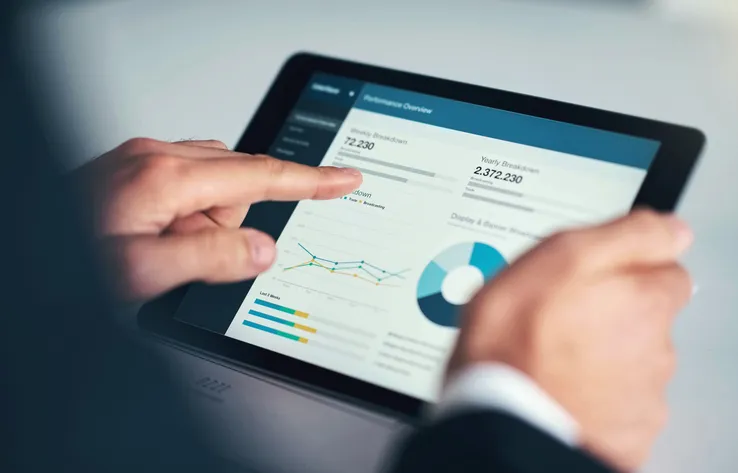Digital wealth management is the use of technology and digital platforms to manage investments and make financial decisions. This approach leverages algorithms, data analytics and user-friendly interfaces to offer tailored financial solutions such as robo-advisors, often at a lower cost than traditional advisory services. Users can manage their portfolios, receive investment advice and execute trades through online platforms or mobile apps, with minimal or no human interaction. This approach is ideal for tech-savvy individuals who prefer the convenience and efficiency of digital tools.
If you prefer a hands-on approach, a financial advisor can work with you to develop a personalized plan.
Benefits of Digital Wealth Management
Digital wealth management platforms offer a range of services, from automated investment strategies to personalized financial planning via robo-advising. These platforms are designed to be intuitive, providing users with insights and recommendations based on their financial goals and risk tolerance. Digital wealth management offers a range of benefits, including:
- Accessibility and convenience: One of the primary benefits of digital wealth management is its accessibility and convenience. With digital platforms, individuals can manage their investments and financial plans from anywhere in the world, at any time. This 24/7 accessibility is particularly beneficial for those with busy schedules or who prefer managing their finances on-the-go.
- Efficient and timely execution: Along with accessibility comes efficiency and timeliness. Automated systems can execute trades and rebalance portfolios quickly, so that investment strategies are implemented without delay. This swift execution in fast-moving markets can significantly impact returns.
- Cost-effective solutions: Another benefit to digital wealth management is its cost compared to more traditional services. By automating processes and utilizing algorithms, digital platforms can reduce operational costs and pass these savings on to users. Lower fees and minimum investment requirements also make these services accessible to a broader audience, including those who might not have considered wealth management due to its cost.
- Personalized financial advice: Digital wealth management also provides users with personalized financial advice. Advanced algorithms and data analytics allow these platforms to create customized investment strategies based on an individual’s financial goals, risk tolerance and time horizon. Users receive tailored recommendations that align with their specific needs, enhancing the likelihood of achieving their financial objectives. This level of personalization was previously available only through traditional financial advisors, but is now accessible to a wider audience through digital means as robo-advisors.
How to Use Digital Wealth Management

To start using digital wealth management, an investor first needs to select a reputable platform. Popular platforms include Betterment, Wealthfront and Personal Capital, which offer a range of services from automated investing to personalized financial advice.
When choosing a digital wealth management platform, consider factors such as fees, services offered, and user experience. Many platforms provide low-cost options with fee structures based on assets under management. You can compare these costs with traditional advisory fees to better understand your potential savings. You might also want to verify that the platform is user-friendly and offers robust customer support, which can be important if you’re new to digital investing.
Once you’ve selected a platform, you’ll set up your account. This process typically involves providing personal information, financial goals, and risk tolerance levels. The platform then uses this data to create a customized investment plan. Some platforms also offer a free trial period or demo accounts, allowing you to explore their features before committing.
Many digital wealth management platforms also offer access to human financial advisors for more personalized financial planning. For instance, Personal Capital provides access to Certified Financial Planners™ who can assist with retirement planning, tax optimization and other financial goals. This hybrid approach combines the efficiency of digital tools with the expertise of human advisors, catering to a broader range of investor needs.
Security Considerations
As with any online activity, security is a primary concern when it comes to digital wealth management. Investors should make sure that the platform they choose uses robust encryption methods and adheres to regulatory standards in protecting personal and financial information. It’s also a good idea to set up two-factor authentication to provide an extra layer of security to your account, as well as monitor your account regularly for any suspicious activity.
Bottom Line

Digital wealth management provides a range of benefits, including accessibility, efficiency, cost-effectiveness and personalization. These advantages make it an appealing option for those looking to manage their finances in a more hands-on, tech-savvy way. By selecting a reputable platform and setting up an account, investors can use digital wealth management to achieve their financial goals.
Wealth Management Tips
- Digital wealth management has its benefits, but there are times when you might need the help of a financial advisor. Finding a financial advisor doesn’t have to be hard. SmartAsset’s free tool matches you with up to three vetted financial advisors who serve your area, and you can have a free introductory call with your advisor matches to decide which one you feel is right for you. If you’re ready to find an advisor who can help you achieve your financial goals, get started now.
- If you’ve decided you’re ready for a traditional financial advisor, you’ll need to decide whether they’re right for you. Consider using SmartAsset’s guide to questions to ask a financial advisor during the interview process.
Photo credit: ©iStock.com/Natee127, ©iStock.com/Kobus Louw, ©iStock.com/shapecharge
